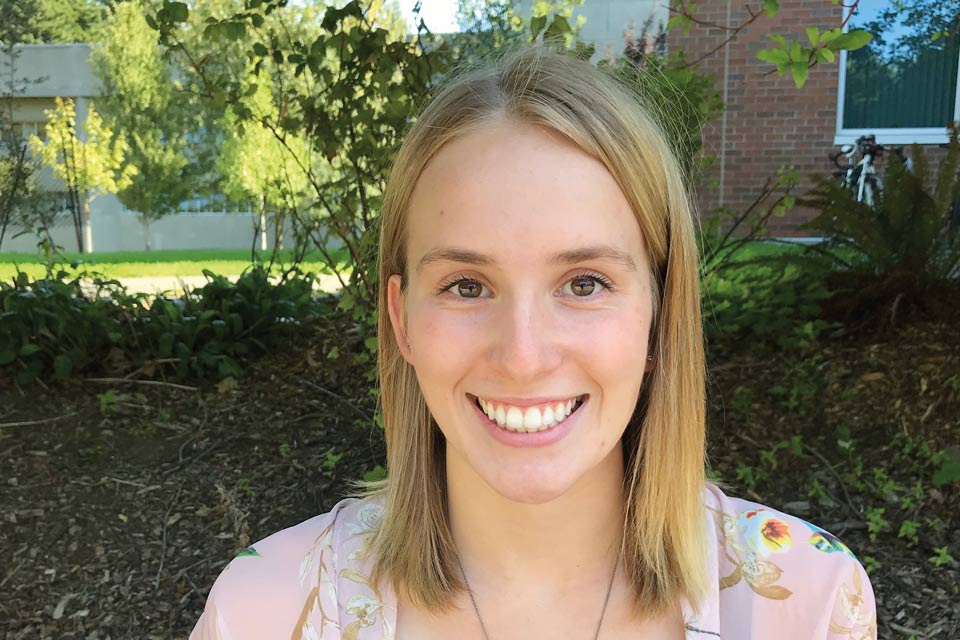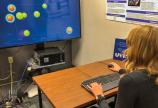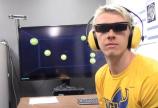Brain gain
- Jenny Manzer

PhD student and former Vikes swimmer Taylor Snowden-Richardson is studying how a cognitive-training system designed for athletes can help people with Traumatic Brain Injuries.
It all started with a very Canadian goal—to try and improve the reaction times and performance of ice-hockey players. UVic neuroscientist Brian Christie was working with a team to study the effects of the NeuroTracker, a patented system resembling a video game that uses 3D multiple object tracking to improve the brain’s fitness.
Christie found something interesting—certain players didn’t improve at the same rate as the others. It turned out these athletes had suffered a concussion in the past. The discovery paved the way for a current UVic study into how NeuroTracker training might help people with Traumatic Brain Injury (TBI).
Lead researcher Taylor Snowden-Richardson says NeuroTracker resembles a video game and is deceptively simple.
But it’s actually a very complex game. It’s requiring your brain to integrate a whole bunch of different functions. And by doing that it’s helping to strengthen some of the areas of your brain and helping your brain talk to the different areas.”
—PhD researcher Taylor Snowden-Richardson
The participant in the lab puts on 3D glasses and sits in front of a large screen showing eight yellow balls. Four of the balls turn orange, which then become the user’s target. The balls turn back to yellow and move around the screen—all in 3D. The user has eight seconds to track the four target balls. If the user does well, the test gets harder next time. It becomes easier if the user does not score well.
Snowden-Richardson describes it as a “staircase” algorithm. Some people are inherently better at multiple object tracking, but the tailored approach prevents frustration. “It’s very adaptive to each individual’s cognitive potential for the task. Everyone’s getting the same amount of stimulation.”
NeuroTracker can be used by many ages and abilities because it is so simple, she says. It was originally developed to improve performance in sports such as football and soccer, but, as Christie discovered, the results also seemed to flag brain injury. “This was the first indication that NeuroTracker might serve as a biomarker for concussion status,” says Snowden-Richardson.
For the current research, her team collaborated with the Victoria Brain Injury Society. The study included 15 subjects with severe concussion or mild-to-moderate TBI. The study, being supervised by Christie, is completed and Snowden-Richardson is now analyzing the data.
The subjects underwent NeuroTracker training twice a week for five weeks. Findings suggest the people not only improved at multiple-object tracking but in other domains, including cognitive functioning, processing, memory attention and even verbal fluency. “It seems to have lots of different benefits,” observes Snowden-Richardson. While every brain injury is different, it commonly involves trouble with memory and attention, a kind of cognitive fog—which NeuroTracker training seems to improve.
The team also worked with neuropsychologists to test cognitive function and gauge if the training is helping patients outside the labs in coping with the rest of their lives. Many of the participants reported that their symptoms—such as headache, dizziness and nausea—improved after the training.
A former Vikes swimmer, Snowden-Richardson did undergrad research into whether NeuroTracker training could speed swimmers’ reaction times from the block—and it did. For her current work, she was awarded a fellowship from the Canadian Institutes of Health Research to do patient-oriented research, which involves incorporating feedback from patients and others in aspects such as study design, objectives and end points.
This makes research directly applicable to practice, she notes. The team would now like to follow up these findings with a larger study, potentially involving blood tests to check for protein markers and use of functional magnetic resonance imaging (fMRI). Snowden-Richardson suggests the NeuroTracker training could also help patients with long COVID address the “brain fog” associated with the condition—and she has already created a protocol for home use of the technology. T



